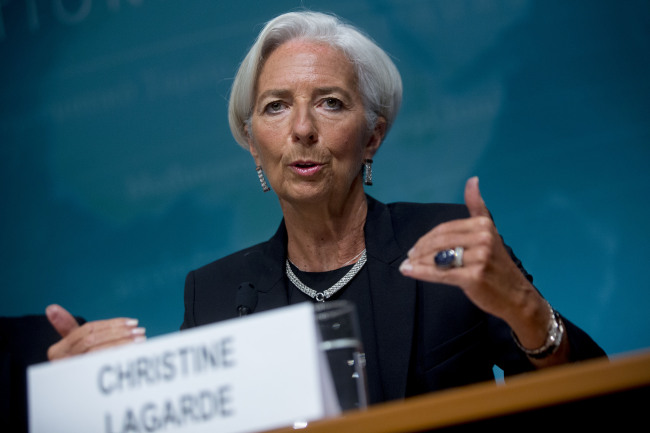WASHINGTON (AFP) ― The International Monetary Fund on Monday slashed its forecast for the United States and urged policymakers to keep interest rates low and raise the minimum wage to strengthen growth in the world’s largest economy.
The global crisis lender said in its annual report card on the U.S. economy that the country will likely grow only 2.0 percent this year, compared with the previous 2.8 percent estimate, blaming mainly the unexpected contraction in the first quarter.
It said growth is likely to rebound to 3.0 percent next year, but to ensure that, the government should take measures like increasing the minimum wage and embarking on a strong infrastructure-building program.
Moreover, the U.S. Federal Reserve should not expect the economy to get back to full employment before the end of 2017, and that it could afford to hold its key interest rate at the zero level past the middle of next year, when the Fed has signaled it expects to raise the rate.
The global crisis lender said in its annual report card on the U.S. economy that the country will likely grow only 2.0 percent this year, compared with the previous 2.8 percent estimate, blaming mainly the unexpected contraction in the first quarter.
It said growth is likely to rebound to 3.0 percent next year, but to ensure that, the government should take measures like increasing the minimum wage and embarking on a strong infrastructure-building program.
Moreover, the U.S. Federal Reserve should not expect the economy to get back to full employment before the end of 2017, and that it could afford to hold its key interest rate at the zero level past the middle of next year, when the Fed has signaled it expects to raise the rate.

“The scars of recession are still visible,” IMF managing director Christine Lagarde warned.
She cited still-high long-term unemployment, low labor-force participation, and the fact that some 50 million Americans still live in poverty.
“There is no single measure that is going to deal with all those issues,” she said.
“The U.S. should invest in its future ... The priority is to invest in people and to invest in infrastructure.”
The IMF report said that the U.S. labor market remains significantly weaker than is implied by the headline 6.3 percent unemployment rate.
It pointed to stagnant wages and the low workforce participation rate, now 62.8 percent compared to more than 66 percent before the 2008 economic crisis.
The IMF said the U.S. government could afford to take short-term measures to strengthen growth and jobs, despite the ongoing large fiscal deficit and huge government debt burden.
But it said that warring political parties need to come up with a medium-term plan for addressing those problems, one that includes revising the tax structure to raise revenues, cutting the growth of health care costs, and fundamentally reforming the government’s social security pension program.
“Given the substantial economic slack in the economy, there is a strong case to provide continued policy support,” the IMF said.
It said more government efforts to boost growth short term would allow the Federal Reserve to more comfortably exit its easy-money stance and cut the risks that stance poses to global financial stability.
At the same time, the IMF said that “regrettably,” U.S. politicians have been unable to agree on such an approach.
Stepping into a hot domestic political battle, the IMF took the side of the administration of President Barack Obama in advocating a rise in the minimum wage.
It noted that, in real terms, wages have fallen significantly over the past four decades, an issue which economists say locks many Americans in poverty.
The Fund said that nearly 50 million Americans still live in poverty, and that the principal way government policy could help would be to return to stronger growth and job creation.
But it added that increasing the minimum wage from the current federal government standard of $7.25 an hour “would help raise incomes for millions of working poor.”
“Any increase of that minimum wage would be helpful from an economic point of view,” said Lagarde.
-
Articles by Korea Herald



![[Herald Interview] 'Amid aging population, Korea to invite more young professionals from overseas'](http://res.heraldm.com/phpwas/restmb_idxmake.php?idx=644&simg=/content/image/2024/04/24/20240424050844_0.jpg&u=20240424200058)















